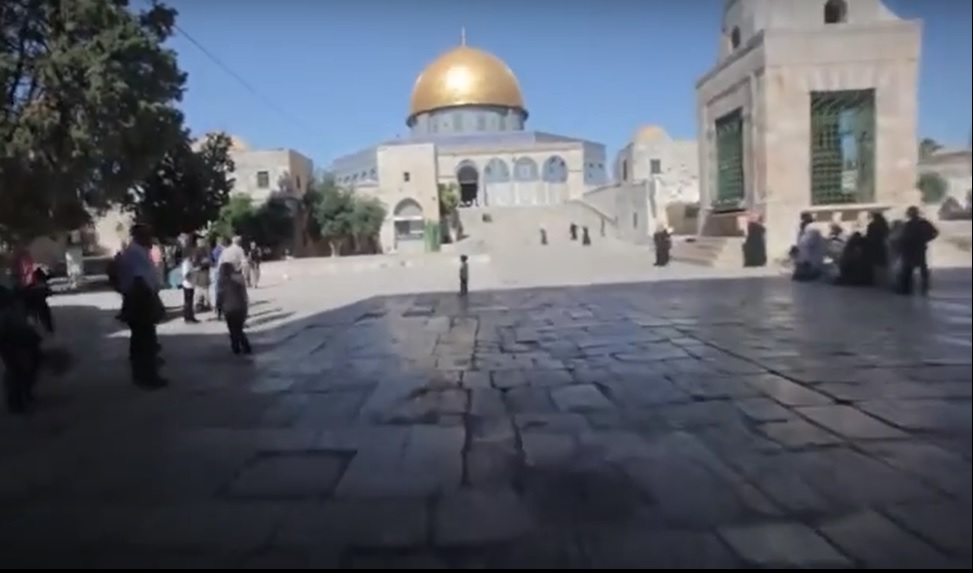The publication of Halevi’s plan has also ignited anger among Palestinian factions in the Gaza Strip and the PA, as well as in Jordan. The proposal suggests that the southern Al-Aqsa Mosque be allocated to Muslims, while the central and northern areas of the Temple Mount, including the Dome of the Rock Mosque, would be given to Jews.
Furthermore, the plan seeks to revoke Jordan’s guardianship of the Temple Mount.
In response to rumors suggesting that Hamas had agreed to a long-term truce with Israel during recent talks in Cairo with Egyptian intelligence, Saleh al-Arouri, the deputy chairman of Hamas’ political bureau, categorically denied the rumors on June 14th during an interview with Al-Aqsa channel.
He emphasized that Hamas would not abandon the resistance against Israel and warned that the Al-Aqsa Mosque is a red line. He stated that all options are open and dangerous regarding this matter.
Al-Arouri also urged the Fatah movement to agree on a unified national strategy that encompasses all forms of resistance. He believed that the current composition of the Israeli government and the international situation present a significant opportunity for the Palestinian strategy to be unified.
While the Israeli Defense Forces’ “Shield and Arrow” operation against the Islamic Jihad in the Gaza Strip had a short-term deterrent effect, Hamas, although not seeking escalation, remains concerned about Halevi’s proposal to divide the Temple Mount.
This proposal has reignited fears among Palestinians that “Al-Mosque is in danger,” despite Prime Minister Netanyahu’s explicit promise to King Abdullah of Jordan that Israel will maintain the status quo on the Temple Mount.
As of now, Prime Minister Netanyahu has not commented on Halevi’s plan, which was published in several Israeli media outlets.
However, senior officials in Jerusalem continue to reiterate that the status quo on the Temple Mount will remain unchanged.
The security establishment hopes that Netanyahu will publicly disapprove of Halevi’s proposal, sending an unequivocal message that the plan holds no relevance.
This would help to ease tensions among Palestinians and Jordanians.
Hamas has initiated a vigorous incitement campaign on social media under the slogan “The Al-Aqsa Mosque will not be divided.”
During a meeting of the Palestinian government in Ramallah on June 13th, Palestinian Prime Minister Muhammad al-Shaythei issued a warning to Israel, cautioning against the implementation of Halevi’s plan to divide the Temple Mount between Jews and Muslims.
He emphasized that such an action would trigger significant outrage, the consequences of which are unknown.
He called on Arab countries and the international community to condemn Israel and impose sanctions.
In Jordan, tensions are running high, with the “Islamic Labor Front” movement, affiliated with the “Muslim Brotherhood” and Hamas, stirring up the Jordanian public and urging the government to expel the Israeli ambassador from Amman.
While the Jordanian government has remained silent for several days, unofficial statements from Jordanian officials indicate that, based on inquiries made with Israel, the Israeli government does not support Halevi’s plan to divide the Temple Mount between Jews and Muslims.
Israel’s position remains unchanged in its commitment to preserving the status quo on the Temple Mount without any alterations.
Jordanian authorities are cautious about publicly criticizing Israel, relying instead on media publications. Nevertheless, pressure from Islamic elements is mounting, and they continue to agitate the Jordanian public.
Israel, on its part, is keen to avoid escalating tensions with Jordan. As a result, it chose not to prosecute Imad Al-Adawan, a Jordanian member of parliament who was apprehended at the Allenby crossing while attempting to smuggle over 200 weapons to terrorist elements in Judea and Samaria.
Al-Adawan was deported to Jordan to prevent any points of friction with the Hashemite Kingdom.
Sources in Jordan indicate that the Jordanian royal house expects the Israeli government to issue an official statement soon, clarifying its commitment to maintain the status quo on the Temple Mount and disapproving of Halevi’s plan.




